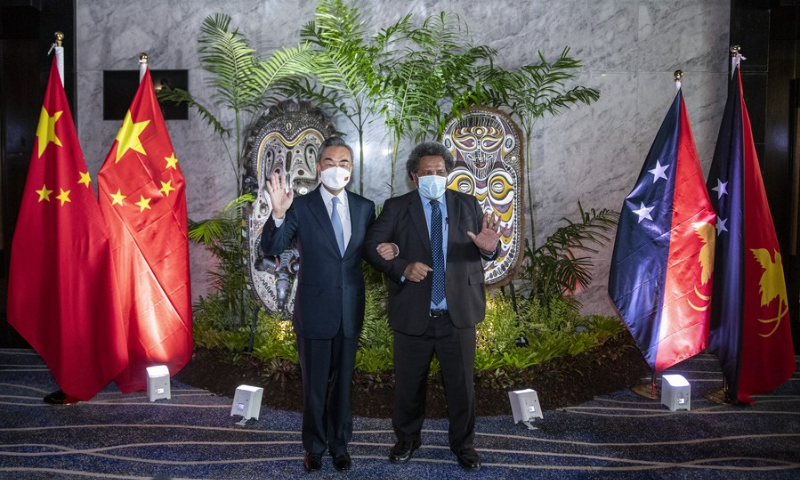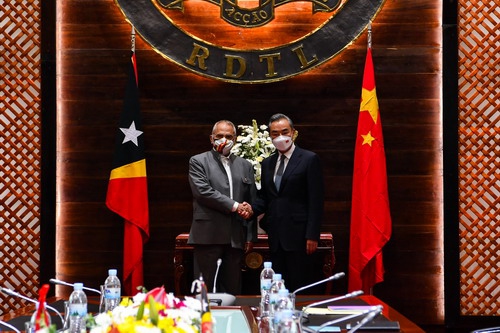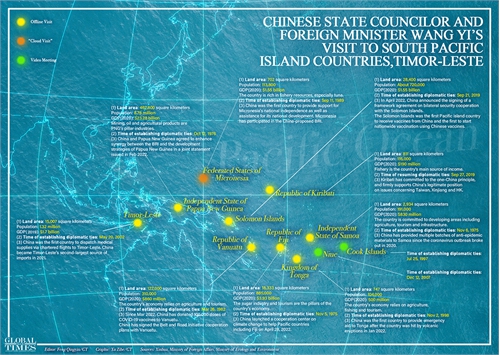Wang Yi summarizes bilateral-multilateral ‘two-wheel drive’ for China-Pacific countries friendship at conclusion of 10-nation visit

Visiting Chinese State Councilor and Foreign Minister Wang Yi meets Soroi Eoe, minister of foreign affairs and international trade of PNG at Port Moresby in Papua New Guinea, on June 3, 2022. (Xinhua/Bai Xuefei)
Chinese State Councilor and Foreign Minister Wang Yi wrapped up his epic island-hopping visit to the Pacific Island countries (PICs) starting from May 26 on Friday, with observers hailing as it was "a miraculous trip" that provided a timely answer to each PICs' individual needs, increases the scope of cooperation, and ushers in an even broader future for both bilateral and multilateral relations for China in the region.
Wang carried out face-to-face meetings, "cloud visits" and virtual connections with 17 leaders of the PIC countries and more than 30 ministerial officials, and cochaired the second China-Pacific Island Countries Foreign Ministers' Meeting in Suva, Fiji.
Wang also hosted meetings with all 10 countries in the region that enjoy diplomatic ties with China. China views all countries, no matter their size, on an equal footing. PICs' enthusiasm and expectations to develop a deeper partnership with China were clear, according to the Chinese Foreign Ministry website Friday.
China and PICs reached 52 cooperation pacts, covering 15 domains including those under the Belt and Road Initiative, climate change responding, the pandemic, green development, health, trade and tourism, Wang said at a press conference held in Port Moresby, Papua New Guinea (PNG), the final stop of his PICs tour. Wang's PNG counterpart Soroi Eoe also attended.
China issued its official document "China's position paper on mutual respect and common development with Pacific Island countries" on Monday, upholding that all countries, regardless of their size, strength and wealth, are equals, and advocating for peace, development, equity, justice, democracy and freedom, which are the common values of humanity.
The Chinese Foreign Ministry said that cooperation between China and the PICs is a vibrant "two-wheel drive" with the bilateral main channel and a new multilateral platform.
PNG's Prime Minister James Marape said during his talks with Wang on Friday that PNG firmly upholds the one-China principle, and it is a common view across the country to develop friendly ties with China. China-proposed BRI has brought significant benefits to developing countries including the PNG, which the PNG is thankful for, especially for the great support for new infrastructure projects.
Marape also vowed to continue deepening bilateral cooperation with China, accelerate the talks and signing of free trade agreement, and provide convenience to facilitate Chinese firms to invest in the country.
Wang stated that the PNG is the leading force in regional development and ties of China-South Pacific Island countries. China speaks highly of PNG's firm support in safeguarding China's core interests and will always be a good friend that PNG can trust.
It was a timely trip that answered the PICs' specific needs to expand cooperation with China amid an anti-China cacophony from the West trying to smear China by selling the "China threat theory" and distorting China's constructive cooperation in the region, Chen Hong, director of the Australian Studies Centre at East China Normal University, told Global Times on Friday.
Unlike US Secretary of State Antony Blinken who summoned the leaders of 18 Pacific island leaders via a video meeting while visiting only Fiji, Wang treated each PIC with great respect, and listened to their individual priorities and needs for development, which is the reason why a great deal of bilateral agreements on cooperation were consolidated during Wang's trip, Chen said.
PNG's former prime minister Peter O'Neill said "I intend to see it that we can rely less on Australia for aid and switch to a more equal trading partner and regional friend." Chen said such remarks obvious refer to China. China never attaches strings to its aid programs, joint projects and other business activities in the region, treating the island countries with equality and sincerity, which is why the governments and people of the PICs in the region have been extending warm welcome to China and Chinese business initiatives.
Combining bilateral and multilateral mechanisms, China and PICs will usher in a new stage for cooperation in domains which include the Blue Economy, education and response to climate change. Unlike Australia and the US whose long-term approach to the region has been characterized by a condescending stance and coercive policies, China's concept of treating each country with equality and respect regardless of their size and level of development will win the hearts of all, Chen said.
Agreeing, Yu Lei, chief research fellow at the research center for Pacific Island countries of Liaocheng University in East China's Shandong Province, told the Global Times on Friday that the smears and demonizing efforts against China by former colonial powers who want to continue their rein over PICs will not cause radical harm to China's ties with countries in the region, as reflected by the significant milestones Wang had achieved during his trip.
China's cooperation with PICs is not to win applause from the West. Instead, it is for the benefit of the Chinese people and people in the developing countries, by which standard, Wang's trip was an undisputed success, Yu said.
PNG is the last leg of Wang's trip to the South Pacific island nations. Before his arrival in PNG, the trip also took Wang to the Solomon Islands, Kiribati, Samoa, Fiji, Tonga and Vanuatu.



